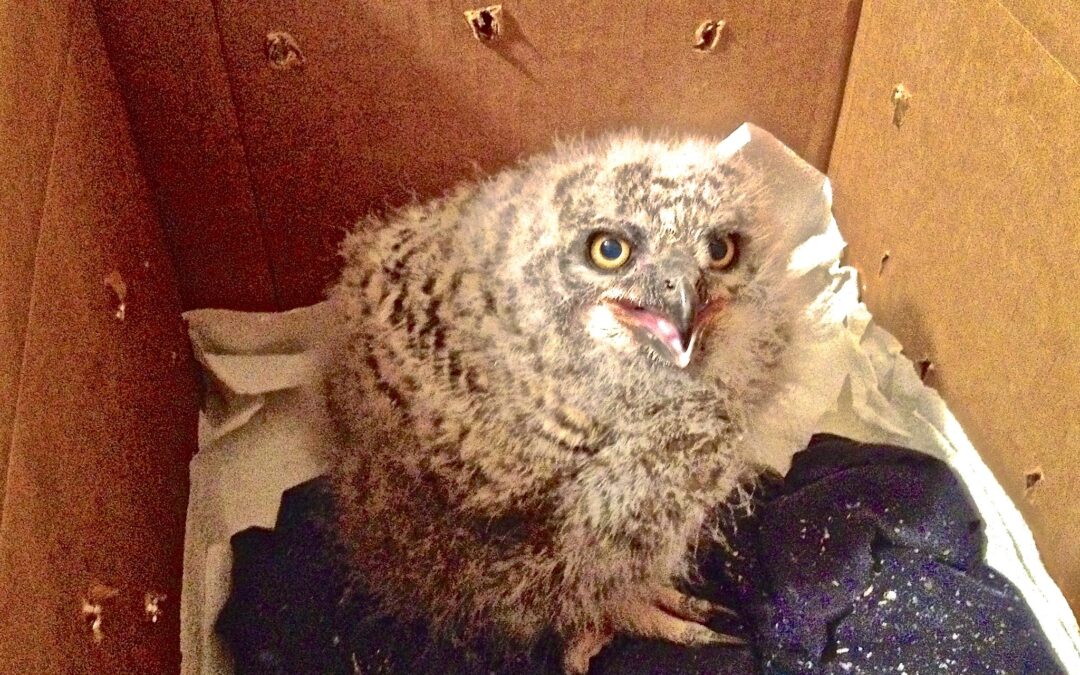Spring means lots of wild youngsters. As the season starts, we are already receiving hurt juveniles and orphans. With calls coming in about what to do about young birds out of the nest, we’re going to share a simple guide about what to do, and what NOT to do, to help them. Believe it or not, if you try to help that bird, you may be doing the wrong thing! Before you touch, move, or otherwise get involved, ask yourself the following:
1. Why is this bird on the ground?
Juvenile birds come out of the nest for many reasons. If it’s small and downy—a very young bird—it may have been pushed or blown out. If the bird is older, with its feathers partly or nearly all in, the bird is likely branching, a critical point in its development where the youngster stands on the edge and practices flapping its wings…and sometimes falls. In that case, it’s a normal part of growing up and learning to be a bird!
2. Does the bird seem hurt or orphaned?
Most of the young birds that come out of the nest do not fall from a great distance. If the bird was a youngster branching, it may have even slowed its fall with flapping—it just can’t get get back up into the nest. Chances are that the bird is fine. Unless there is an obvious medical problem, like a bird trying to walk around in the grass unable to put weight on a leg, don’t assume there are any injuries. Don’t try to handle the bird to examine it—even a small raptor like a kestrel bites and can use its feet quite effectively against a would-be rescuer.
As far as being orphaned, it’s quite rare. You may not see the nest or the parents, but they’re around and hearing the youngster. Only if you see a dead parent, such as a bird that has been shot, should you assume that no bird is around to care for the youngster.
3. If the bird seems ok, is this bird safe where it is?
Unless the bird is right on the edge of a busy road or you have pets in the area that are likely to attack it, the bird is probably safe. Mom and dad don’t stop caring for the juvenile just because it’s on the ground. It will call to them, and they’ll keep taking care of business as usual.
4. It’s not safe from my dog… what do I do?
If the bird is not safe, you can help by scooping the young bird up into a basket or shallow box (this is where you might want to call for handling instructions!) and putting the new “nest” up in the crook of a tree branch, or even on a human made object in the area like a picnic table if the branches are quite high. The parents DO NOT abandon the youngster if you touch it—most birds do not have a sense of smell. Even if you don’t see the nest, don’t feel the need to go looking for it. Don’t choose a “safer” spot somewhere else, like that shorter tree across the yard—you want to put the youngster as close as possible to where you found it.
5. Should I check up on the bird?
Please do not start taking photos, checking on the youngster, or going back and forth to where it is over and over for any other reason. Please leave it alone for the parents to raise. Your repeated presence, not you’re touching the bird, is what causes a young bird out of the nest to get abandoned or eaten. You see, every time we visit an area, we leave a scent trail. By coming back to the bird over and over, you’ll leave a strong one that a hungry predator will check out. The parents can’t protect a baby that has big neon scent-arrows pointing to it, announcing “Dinner here!”
6. The bird is hurt or truly orphaned—so what do I do?
If that’s the case, the bird needs professional help from a rehabilitator. Please don’t try to take care of the bird yourself. They require special diets. Human contact, even voices, can result in the bird becoming imprinted on humans, which will likely make it un-releasable to the wild. If the bird is a raptor (eagle, owl, hawk, falcon, vulture, or kite), please call your local or regional raptor rehabilitator, like Last Chance Forever. If you don’t know who to call and can’t find an obvious answer in the phone book or online, talk to a local game warden. If the bird is not a raptor, contact one of the less specialized wildlife rehabilitation organizations in your area.

